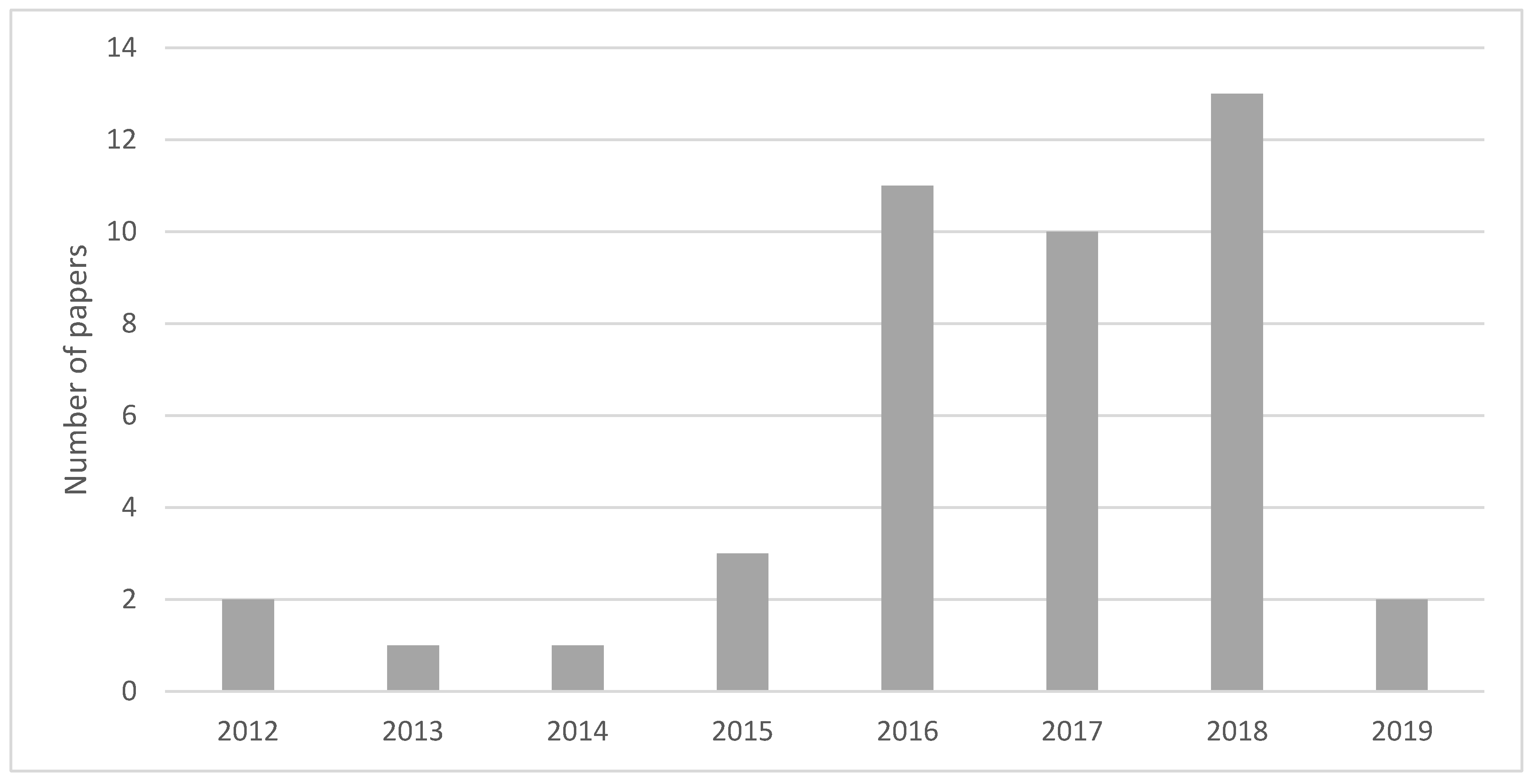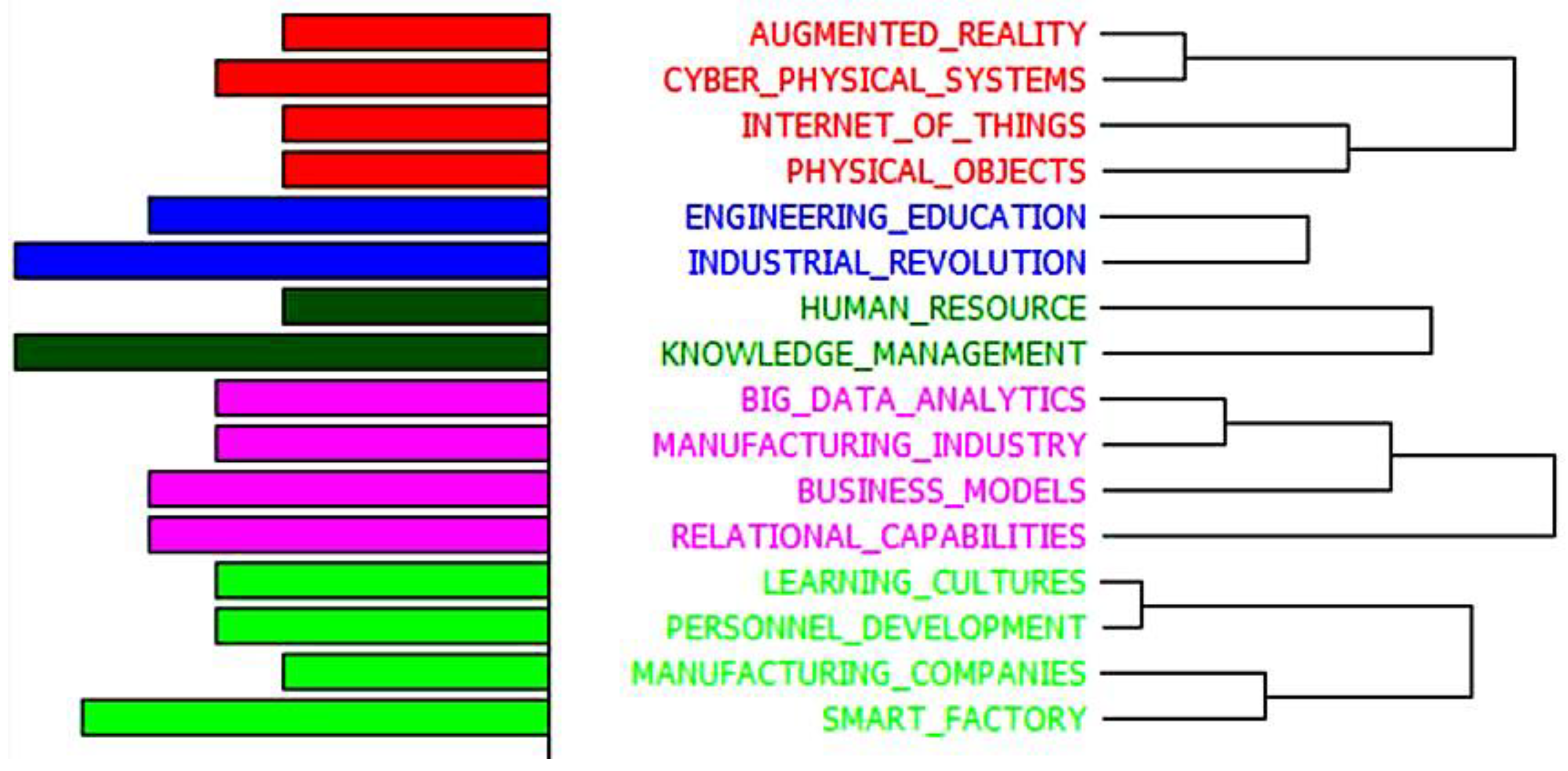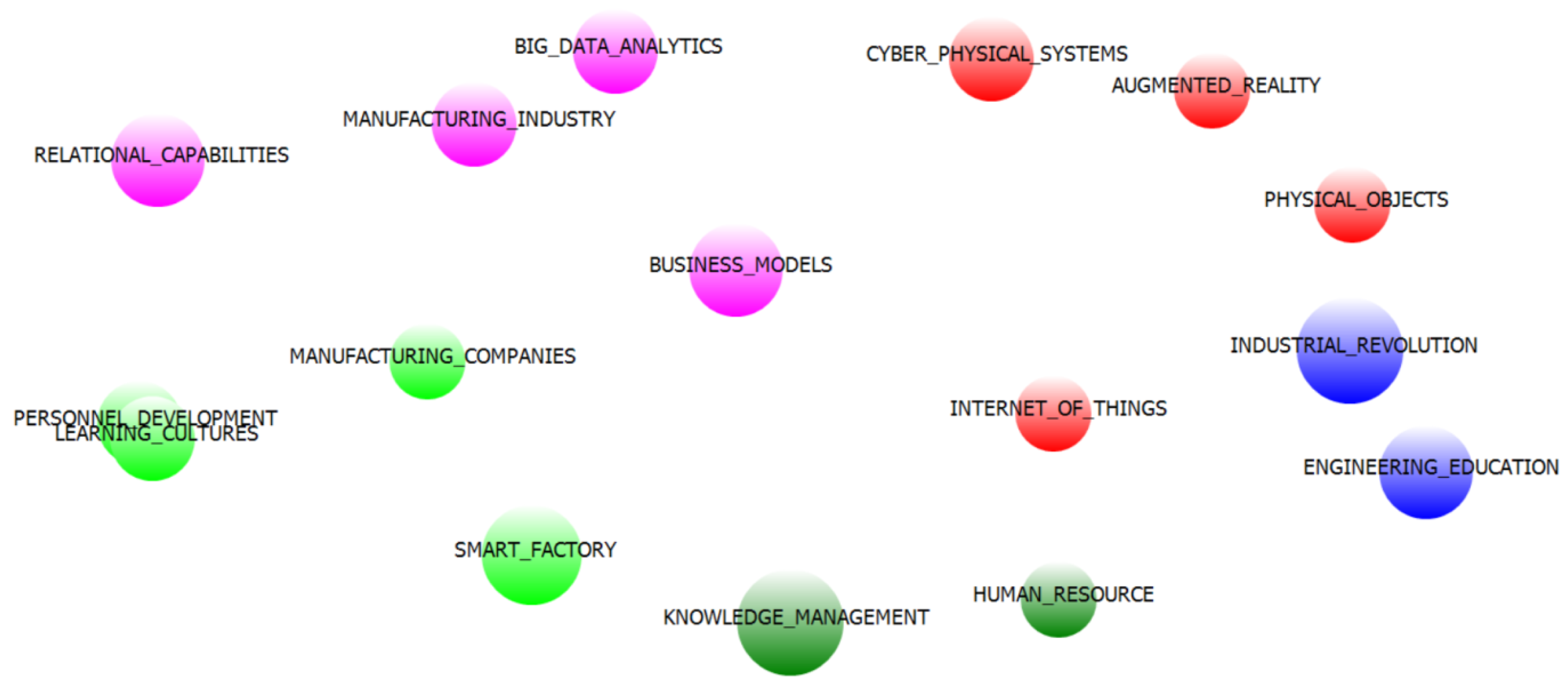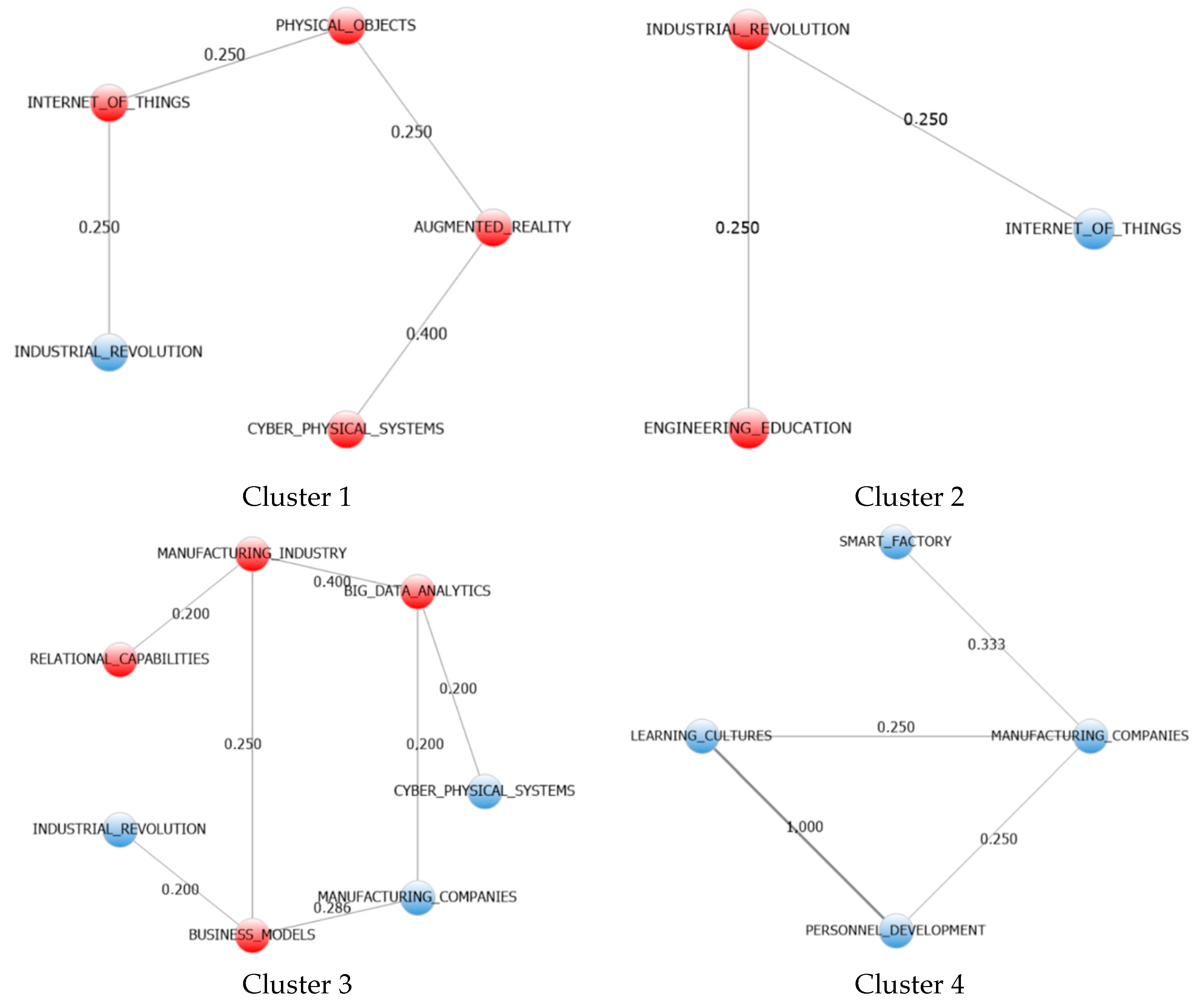A Bibliometric and Topic Analysis on Future Competences at Smart Factories
Abstract
:1. Introduction
2. The Concept of Smart Factories
3. Competences in the Production Sector
4. Methods
5. Results and Discussion
5.1. Bibliometric Analysis
5.2. Topic Mining
- Cluster 1 includes abstracts with the co-occurring phrases: augmented reality, cyber physical systems, internet of things, and physical objects.
- Cluster 2 includes abstracts with the co-occurring phrases: engineering education and industrial revolution.
- Cluster 3 includes abstracts with the co-occurring phrases: human resources and knowledge management.
- Cluster 4 includes abstracts with the co-occurring phrases: big data analytics, manufacturing industry, business models, and relational capabilities.
- Cluster 5 includes abstracts with the co-occurring phrases: learning cultures, personnel development, manufacturing companies, and smart factory.
5.3. Content Analysis
- Cluster 1, which includes papers on the topic personnel development,
- Cluster 2, which includes papers about training techniques for personnel,
- Cluster 3, which includes papers about future engineering profile, and
- Cluster 4, which includes papers about relational capabilities.
6. Conclusions
Author Contributions
Funding
Conflicts of Interest
References
- Möller, D.P. Digital manufacturing/Industry 4.0. In Guide to Computing Fundamentals in Cyber-Physical Systems, 1st ed.; Möller, D.P., Ed.; Springer: Cham, Switzerland, 2016; pp. 307–375. ISBN 978-3-319-25178-3. [Google Scholar]
- Roblek, V.; Meško, M.; Krapež, A. A complex view of Industry 4.0. SAGE Open 2016, 6, 1–11. [Google Scholar] [CrossRef]
- Crnjac, M.; Veža, I.; Banduka, N. From concept to the introduction of Industry 4.0. Int. J. Eng. Manag. 2017, 8, 21–30. [Google Scholar]
- Flynn, J.; Dance, S.; Schaefer, D. Industry 4.0 and its potential impact on employment demographics in the UK. Adv. Transdiscipl. Eng. 2017, 6, 239–244. [Google Scholar] [CrossRef]
- Posada, J.; Toro, C.; Barandiaran, I.; Oyarzun, D.; Stricker, D.; De Amicis, R.; Vallarino, I. Visual computing as a key enabling technology for Industrie 4.0 and industrial internet. IEEE Comput. Graph. Appl. 2015, 35, 26–40. [Google Scholar] [CrossRef] [PubMed]
- Mabkhot, M.M.; Al-Ahmari, A.M.; Salah, B.; Alkhalefah, H. Requirements of the Smart Factory System: A Survey and Perspective. Machines 2018, 6, 23. [Google Scholar] [CrossRef]
- Dombrowski, U.; Wagner, T. Mental strain as field of action in the 4th industrial revolution. Procedia CIRP 2014, 17, 100–105. [Google Scholar] [CrossRef]
- Morlock, F.; Wienbruch, T.; Leineweber, S.; Kreimeier, D.; Kuhlenkoetter, B. Industry transformation of manufacturing companies—Maturity based migration to cyber-physical-manufacturing system. ZWF Z. Wirtsch. Fabr. 2016, 111, 306–309. [Google Scholar] [CrossRef]
- Herzog, S.; Sanders, A.; Redlich, T.; Wulfsberg, J. Mitarbeiterqualifikation in der Smart Factory: Ansatzpunkte zum Qualifizierungsbedarf der Mitarbeiter ausgehend von neuartigen Geschäftsmodellen einer Smart Factory. ZWF Z. Wirtsch. Fabr. 2016, 111, 653–657. (In German) [Google Scholar] [CrossRef]
- Achenhagen, C.; Zeller, B. Zukünftige Qualifikationsanforderungen im “Internet der Dinge” in der Industriellen Produktion. 2011. Available online: http://www.frequenz.net/uploads/tx_freqprojerg/Summary_indProd_final.pdf (accessed on 6 May 2018).
- Hecklau, F.; Galeitzke, M.; Flachs, S.; Kohl, H. Holistic approach for human resource management in Industry 4.0. Procedia CIRP 2016, 54, 1–6. [Google Scholar] [CrossRef]
- Kremer, D. Prozess-szenarien für Die Industrie 4.0. 2014. Available online: https://www.iao.fraunhofer.de/images/iao-news/iao-news_oktober_2014.pdf (accessed on 13 May 2018).
- Zhang, J.; Yao, X.; Zhou, J.; Jiang, J.; Chen, X. Self-organizing manufacturing: Current status and prospect for Industry 4.0. In Proceedings of the 2017 5th International Conference on Entrerprise Systems: Industrial Digitalization by Entrerprise Systems, Barcelona, Spain, 14–15 October 2017. [Google Scholar]
- Bertoncel, T.; Erenda, I.; Meško, M. Managerial Early Warning system as best Practice for Project Selection at a Smart Factory. Amfiteatru Econ. 2018, 20, 805–819. [Google Scholar] [CrossRef]
- Kane, G.C.; Palmer, D.; Phillips, A.N.; Kiron, D. Is your business ready for a digital future? MIT Sloan Manag. Rev. 2015, 56, 37–44. [Google Scholar]
- Macurova, P.; Ludvik, L.; Žwakova, M. The driving factors, risks and barriers of the Industry 4.0 concept. J. Appl. Econ. Sci. 2017, 12, 2003–2011. [Google Scholar]
- Wang, S.; Wan, J.; Li, D.; Zhang, C. Implementing smart factory of Industry 4.0: An outlook. Int. J. Distrib. Sens. Netw. 2016, 12, 3159805. [Google Scholar] [CrossRef]
- Radziwon, A.; Bilberg, A.; Bogers, M.; Madsen, E.S. The smart factory: Exploring adaptive and flexible manufacturing solutions. Procedia Eng. 2014, 69, 1184–1190. [Google Scholar] [CrossRef]
- Ivanov, D.; Dolgui, A.; Sokolov, B.; Werner, F.; Ivanova, M. A dynamic model and an algorithm for short-term supply chain scheduling in the smart factory Industry 4.0. Int. J. Prod. Res. 2016, 54, 386–402. [Google Scholar] [CrossRef]
- Lucke, D.; Constantinescu, C.; Westkämper, E. Smart factory-a step towards the next generation of manufacturing. In Proceedings of the 41st CIRP Conference on Manufacturing Systems, Tokyo, Japan, 26–28 May 2018; Springer: London, UK, 2008; pp. 115–118. [Google Scholar]
- Yoon, J.S.; Shin, S.J.; Suh, S.H. A conceptual framework for the ubiquitous factory. Int. J. Prod. Res. 2012, 50, 2174–2189. [Google Scholar] [CrossRef]
- Ghobakhloo, M. The future of manufacturing industry: A strategic roadmap toward Industry 4.0. J. Manuf. Technol. Manag. 2018, 29, 910–936. [Google Scholar] [CrossRef]
- Yao, X.; Zhou, J.; Zhang, J.; Boër, C.R. From intelligent manufacturing to smart manufacturing for Industry 4.0 driven by next generation artificial intelligence and further on. In Proceedings of the 2017 5th International Conference on Enterprise Systems (ES), Beijing, China, 22–24 September 2017; pp. 311–318. [Google Scholar]
- Gruber, F.E. Industry 4.0: A best practice project of the automotive industry. In Digital Product and Process Development Systems; Kovács, G.L., Kochan, D., Eds.; Springer: Berlin/Heidelberg, Germany, 2013; pp. 36–40. ISBN 978-3-642-41329-2. [Google Scholar]
- Mulder, M.; Gulikers, J.; Biemans, H.; Wesselink, R. The new competence concept in higher education: Error or enrichment? J. Eur. Ind. Train. 2009, 33, 755–770. [Google Scholar] [CrossRef]
- Boyatizs, R.E. The Competent Manager: A Model for Effective Performance; John Wiley and Sons: New York, NY, USA, 1982. [Google Scholar]
- Roberts, G. Recruitment and Selection: A Competency Approach; Chartered Institute of Personnel and Development: London, UK, 1997. [Google Scholar]
- Torres, M.V.T.; Cardelle-Elawar, M.; Mena, M.J.B.; Sanchez, A.M.M. Social background, gender and self-reported social competence in 11- and 12-year-old Andalusian children. Electron. J. Res. Educ. Psychol. 2003, 1, 38–56. [Google Scholar]
- Spencer, L.M.; Spencer, S.M. Competence at Work: Models for Superior Performance; Wiley: New York, NY, USA, 1993; ISSN 978-0471548096. [Google Scholar]
- Erpenbeck, J.; Von Rosenstiel, L. Handbuch Kompetenzmessung: Erkennen, verstehen und bewerten von Kompetenzen in der betrieblichen, pädagogischen und psychologischen Praxis. In Research Challenges of Industry 4.0 for Quality Management; Foidl, H., Felderer, M., Eds.; Schäffer-Poeschel: Stuttgart, Germany, 2016; pp. 121–137. (In German) [Google Scholar]
- Erol, S.; Jäger, A.; Hold, P.; Ott, K.; Sihn, W. Tangible Industry 4.0: A scenario-based approach to learning for the future of production. Procedia CIRP 2016, 54, 13–18. [Google Scholar] [CrossRef]
- Hecklau, F.; Orth, R.; Kidschun, F.; Kohl, H. Human resources management: Meta-study-analysis of future competences in Industry 4.0. In Proceedings of the 13th European Conference on Management, Leadership and Governance: ECMLG 2017, Utrecht, The Netherlands, 18–19 October 2017; Academic Conferences and Publishing Limited: Utrecht, The Netherlands, 2017; p. 163. [Google Scholar]
- Plumanns, L.; Printz, S.; Vossen, R.; Jeschke, S. Strategic management of personnel development in the Industry 4.0. In Proceedings of the 14th International Conference on Intellectual Capital and Knowledge Management and Organisational Learning, Honk Kong, China, 7–8 December 2017; Academic Conferences International Limited: Oxfordshire, UK, 2017; pp. 179–186. [Google Scholar]
- Kinkel, S.; Schemmann, B.; Lichtner, R. Critical competencies for the innovativeness of value creation champions: Identifying challenges and work-integrated solutions. Procedia Manuf. 2017, 9, 323–330. [Google Scholar] [CrossRef]
- Prinz, C.; Morlock, F.; Freith, S.; Kreggenfeld, N.; Kreimeier, D.; Kuhlenkötter, B. Learning factory modules for smart factories in Industrie 4.0. Procedia CIRP 2016, 54, 113–118. [Google Scholar] [CrossRef]
- Noehring, F.; Woestmann, R.; Wienzek, T.; Deuse, J. Socio-technical capability assessment to support implementation of cyber-physical production systems in line with people and organization. In Proceedings of the International Conference on Applied Human Factors and Ergonomics, Orlando, FL, USA, 21–25 July 2018; Springer: Cham, Switzerland, 2018; pp. 299–311. [Google Scholar]
- Straub, N.; Kaczmarek, S.; Hegmanns, T.; May, D.; Haertel, T.; Möllmann, A.; Zaremba, B. Kompetenzmodell für die operative Logistik in der Arbeitswelt 4.0. ZWF Zeitschrift Wirtschaftlichen Fabrikbetrieb 2016, 111, 645–649. (In German) [Google Scholar] [CrossRef]
- Gitelman, L.; Kozhevnikov, M. Paradigm of managerial education for a technological breakthrough in the economy. Econ. Reg. 2018, 1, 433–449. [Google Scholar] [CrossRef]
- Nyikes, Z. Contemporary digital competency review. INDECS 2018, 16, 124–131. [Google Scholar] [CrossRef]
- Queiruga-Dios, A.; Bullón Pérez, J.; Hernández Encinas, A.; Martín Del Rey, A.; Martín-Vaquero, J. Case study: Engineering education, Industry 4.0, security, and competencies-based assessment. In Proceedings of the 45th SEFI Annual Conference 2017—Education Excellence for Sustainability, Azores, Portugal, 18–21 September 2017; SEFI: Brussels, Belgium, 2017; pp. 1410–1416, ISBN 978-989-98875-7-2. [Google Scholar]
- Sangmeister, J.; Winther, E.; Deutscher, V.; Bley, S.; Kreuzer, C.; Weber, S. Designing competence assessment in VET for a digital future. In Digital Workplace Learning; Springer: Cham, Switzerland, 2018; pp. 65–92. ISBN 978-3-319-46215-8. [Google Scholar]
- Boronina, L.N.; Baliasov, A.A.; Sholina, I.I. Professional potential of future engineers in Russia’s old-industrial region: Institutional challenges and risks. In Proceedings of the 10th International Conference of Education, Research and Innovation, Seville, Spain, 16–18 November 2017; pp. 4827–4836. [Google Scholar]
- Guidelines Support Companies during Formation of Industry-4.0-Competencies in the Workforce. Available online: https://www.plattform-i40.de/I40/Redaktion/DE/Downloads/Publikation/i40-gestalten.pdf?__blob=publicationFile&v=4 (accessed on 20 July 2018). (In German).
- Richert, A.; Shehadeh, M.; Plumanns, L.; Groß, K.; Schuster, K.; Jeschke, S. Educating engineers for Industry 4.0: Virtual worlds and human-robot-teams: Empirical studies towards a new educational age. In Proceedings of the Global Engineering Education Conference (EDUCON), Abu Dhabi, United Arab Emirates, 10–13 April 2016; pp. 142–149. [Google Scholar]
- Longo, F.; Nicoletti, L.; Padovano, A. Smart operators in Industry 4.0: A human-centered approach to enhance operators’ capabilities and competencies within the new smart factory context. Comput. Ind. Eng. 2017, 113, 144–159. [Google Scholar] [CrossRef]
- Martins, J.T. Relational capabilities to leverage new knowledge: Managing directors’ perceptions in UK and Portugal old industrial regions. Learn. Organ. 2016, 23, 398–414. [Google Scholar] [CrossRef]
- Quint, F.; Sebastian, K.; Gorecky, D. A mixed-reality learning environment. Procedia Comput. Sci. 2015, 75, 43–48. [Google Scholar] [CrossRef]
- Pecina, P.; Sladek, P. Fourth industrial revolution and technical education. In Proceedings of the 11th International Conference on Technology, Education and Development (INTED), Valencia, Spain, 6–8 March 2017; pp. 2089–2093. [Google Scholar]
- Imran, F.; Kantola, J. Review of Industry 4.0 in the Light of Sociotechnical System Theory and Competence-Based View: A Future Research Agenda for the Evolute Approach. In Proceedings of the International Conference on Applied Human Factors and Ergonomics, Orlando, FL, USA, 21–25 July 2018; Springer: Heidelberg, Germany, 2018; pp. 118–128. [Google Scholar]
- Vacek, J. Socio-economic aspects of Industry 4.0. In Innovation Management, Entrepreneurship and Corporate Sustainability (IMECS 2016); Vysoká škola ekonomická v Praze: Praha, Czechia, 2016; pp. 731–741. [Google Scholar]
- Janjua, S.Y.; Naeem, M.A.; Kayani, F.N. The competence classification framework a classification model for employee development. Interdiscip. J. Contemp. Res. Bus. 2012, 4, 396–404. [Google Scholar]





| Conference | # | Journals | # |
|---|---|---|---|
| Proceedings of AICS | 4 | ZWF | 4 |
| Procedia CIRP | 4 | International Journal of Fashion Design, Technology and Education | 3 |
| Procedia Manufacturing | 4 | Benchmarking: An International Journal | 1 |
| Proceedings of the 10th ICERI | 1 | COMPUT IND ENG | 1 |
| ACM International Conference Proceeding Series | 1 | Economy of Region | 1 |
| 8th IFKAD 2013 | 1 | EKSPLOAT NIEZAWODN | 1 |
| IOP Conference Series: Earth and Environmental Science | 1 | INDECS | 1 |
| Lecture Notes in Mechanical Engineering | 1 | International Journal of Quality and Service Sciences | 1 |
| Proceedings of METAL 2016 | 1 | International Journal of Technology Management | 1 |
| Procedia Computer Science | 1 | Journal of Organisational Transformation and Social Change | 1 |
| Procedia Engineering | 1 | Kasetsart Journal of Social Sciences | 1 |
| Procedia Social and Behavioral Sciences | 1 | The Learning Organization | 1 |
| Proceedings 2015 IEEE | 1 | ||
| Proceedings of the 13th ECMLG | 1 | ||
| Proceedings of the 14th ICICKM | 1 | ||
| Proceedings of the 30th IBIMA 2017 | 1 | ||
| Proceedings of the 45th SEFI | 1 |
| Extracted Phrases | Frequency | No. of Cases | % Case | Length | TF • IDF |
|---|---|---|---|---|---|
| industrial revolution | 8 | 7 | 16.67% | 2 | 6.2 |
| knowledge management | 8 | 5 | 11.90% | 2 | 7.4 |
| smart factory | 7 | 4 | 9.52% | 2 | 7.1 |
| business models | 6 | 5 | 11.90% | 2 | 5.5 |
| engineering education | 6 | 3 | 7.14% | 2 | 6.9 |
| facility management | 6 | 1 | 2.38% | 2 | 9.7 |
| relational capabilities | 6 | 1 | 2.38% | 2 | 9.7 |
| big data analytics | 5 | 2 | 4.76% | 3 | 6.6 |
| cyber physical systems | 5 | 4 | 9.52% | 3 | 5.1 |
| digital competency | 5 | 3 | 7.14% | 2 | 5.7 |
| learning cultures | 5 | 1 | 2.38% | 2 | 8.1 |
| manufacturing industry | 5 | 5 | 11.90% | 2 | 4.6 |
| personnel development | 5 | 1 | 2.38% | 2 | 8.1 |
| augmented reality | 4 | 3 | 7.14% | 2 | 4.6 |
| human resource | 4 | 2 | 4.76% | 2 | 5.3 |
| internet of things | 4 | 3 | 7.14% | 3 | 4.6 |
| level of digital | 4 | 2 | 4.76% | 3 | 5.3 |
| managerial education | 4 | 1 | 2.38% | 2 | 6.5 |
| manufacturing companies | 4 | 4 | 9.52% | 2 | 4.1 |
| manufacturing enterprises | 4 | 2 | 4.76% | 2 | 5.3 |
| physical objects | 4 | 2 | 4.76% | 2 | 5.3 |
| Technical Competences | Methodological Competences | Social Competences | Personal Competences |
|---|---|---|---|
| understanding IT security | creativity | seeing the big picture (overview competence, integration competence) | commitment to lifelong learning |
| coding capabilities | problem solving | the ability to lead | personal flexibility |
| understanding of processes | creative problem-solving competence | the ability to communicate effectively in complex situations | motivation for learning |
| technical capabilities | conflict resolution | network competence | adaptability |
| understanding the analogies of the operation of new technologies | the ability to act as mediators in decision-making processes | the ability to participate and work in a team | ability to work in stressful situations |
| the ability to solve complex challenges | analytical skills | language skills | social responsibility |
| research skills | the ability to transfer knowledge to others | the successful determination of the dividing line between important and less important information |
© 2018 by the authors. Licensee MDPI, Basel, Switzerland. This article is an open access article distributed under the terms and conditions of the Creative Commons Attribution (CC BY) license (http://creativecommons.org/licenses/by/4.0/).
Share and Cite
Jerman, A.; Pejić Bach, M.; Bertoncelj, A. A Bibliometric and Topic Analysis on Future Competences at Smart Factories. Machines 2018, 6, 41. https://doi.org/10.3390/machines6030041
Jerman A, Pejić Bach M, Bertoncelj A. A Bibliometric and Topic Analysis on Future Competences at Smart Factories. Machines. 2018; 6(3):41. https://doi.org/10.3390/machines6030041
Chicago/Turabian StyleJerman, Andrej, Mirjana Pejić Bach, and Andrej Bertoncelj. 2018. "A Bibliometric and Topic Analysis on Future Competences at Smart Factories" Machines 6, no. 3: 41. https://doi.org/10.3390/machines6030041
APA StyleJerman, A., Pejić Bach, M., & Bertoncelj, A. (2018). A Bibliometric and Topic Analysis on Future Competences at Smart Factories. Machines, 6(3), 41. https://doi.org/10.3390/machines6030041






